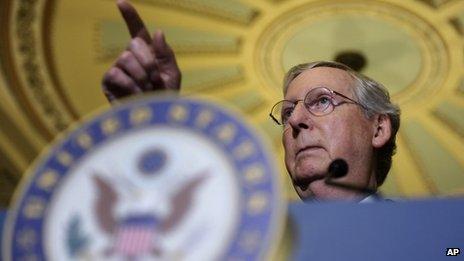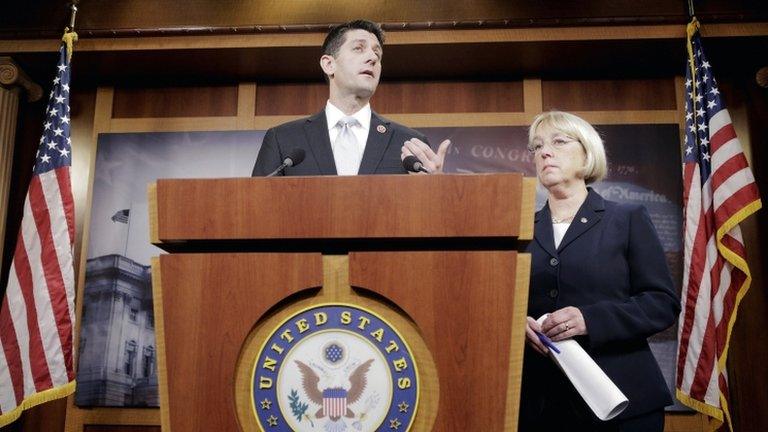Republicans decide their future in 2014
- Published
- comments

Tea Party backers - who are known for sporting 18th Century costume out of reverence for the early American patriots - thrive on a sense of persecution
Republicans should be going into 2014 with some trepidation.
It is not the size of the immediate prize in November's elections. Few think they can win the Senate, and the risk of losing the House isn't that great.
But this year could define something more important than seats, more important even than the party's direction: its brand image, its flavour, its mouthfeel, how Americans see the elephant in the room.
The Tea Party was, without any doubt, the force that gave back the Republicans their spirit after 2008 and "shellacked" President Barack Obama and the Democrats in the 2010 mid-terms. The question this year is whether it will be a drag on the party's fortunes.
Hispanic voters
The Republican establishment in Congress saw its already low reputation plummet after the government shutdown in October.
In the view of some who consider themselves older and wiser, this shutdown was a craven cave-in to the immature class of 2012 - an exercise in pointlessness that they knew they couldn't sustain.
So in the dying days of last year they did a modest budget deal, against Tea Party wishes.
It may not be the last.
There is a lot of talk that John Boehner will do some sort of a deal on immigration.
That would be hugely important - immigration is the canary in the coal mine for Republican seriousness about change.
Perhaps the Republicans could win the rapidly-growing Hispanic vote without immigration reform. And perhaps they can win the White House without more Hispanic voters.
Perhaps. But you will have to explain carefully how before I'll believe it.
A fight-back?
There is another important sign too.

The Senate's top Republican, Mitch McConnell, has his own Tea Party challenger
We are beginning to see sitting Tea Party candidates challenged by establishment ones - a fight-back.
It's hesitant, and careful - one strategist told me he wanted only to prevent candidates who would be seen as half-mad by the media, who talked about witchcraft or rape being part of God's plan.
Others are more adamant that they have to take back their party before they can take back the country.
Of course none of this will daunt the Tea Party - their challenge to the establishment is still far more open and forthright. There will be battles against the Senate's top Republican, Mitch McConnell in Kentucky, and in Mississippi, where Thad Cochran has been in the Senate for 34 years.
But if the Republican establishment has dithered before striking back it is because it understands the enormity of the task.
It is important to note that this is not yet an outright ideological struggle - nearly all Republicans are low-tax, anti-big government, anti-abortion, anti-gun control. On immigration and gay marriage there are some more shades of grey.
The Republican fight-back so far is more about tone and strategy than ideology.
Are they just the party of loud and emphatic "No"? Of furious and righteous resistance to Mr Obama?
Or do they sound more positive, offer alternatives, some that may include doing deals with the accursed enemy?
It strikes me how many Tea Party people are now a little shy of the label. Time after time I've heard them say, "I'm a Goldwater Republican."
They may worship at the shrine of St Ronnie, but it is Barry Goldwater, the failed 1964 presidential candidate, who is their martyr.
And these people like their martyrs - they thrive on a sense of persecution, of the City on the Hill shrinking around them, lapped by alien waters.
It's very Southern, very founding fathers. It is also very popular in the places where Republicans do well.
Beyond the Hill
This is an important point - from British newspapers to Republicans on Capitol Hill there is a tendency to see the Tea Party faction as a weird bunch of extremists who have wrested control of their party from more normal members.
On a visit to Texas during the government shutdown, I was struck by how many ordinary people supported it, and relished what they saw as a display of backbone.
The Tea Party view of the world may be a lot closer to that of the average Republican on the street in the Midwest and the South than it is to that of the party's leaders on the Hill.
It is a particular manifestation of a conservative revolt against a new status quo that began in the late 1950s.
The trouble is that the strategy that won the South for Republicans for a generation is now seen by many as a road to electoral ruin.
Ironically, the attitude of many of the participants also has roots in the 1960s - they're romantic rebels who are instinctively anti-establishment and suspicious of authority. They are not easy to cow, or beat.
The Republican Civil War has not yet begun in earnest, and may take a while in the making. But these mid-terms and the primaries will be powerfully important for those vying for the presidential nomination in 2016.
- Published6 January 2014
- Published18 December 2013
